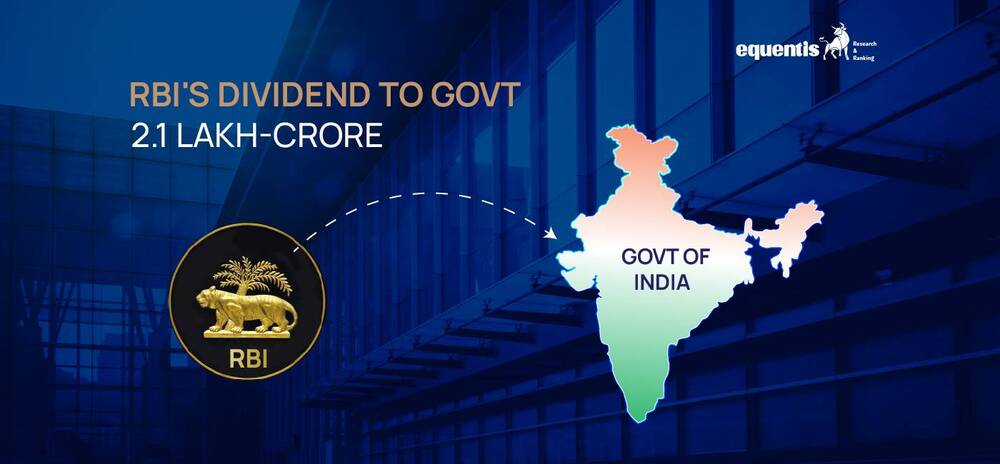In a landmark move, the Reserve Bank of India (RBI) has announced a record dividend payout of Rs 2.1 lakh crore to the government. This substantial infusion of funds has sparked discussions about its potential impact on India’s credit rating.
The RBI’s robust earnings are probably linked to various factors, one of which could be the increase in interest rates in the United States. RBI invests a substantial portion of its foreign currency reserves, which are valued at $644 billion, in U.S. bonds. Let’s explore the reasons in detail and examine how they might influence India’s creditworthiness on the global stage.
4 Factors Behind the Record Dividend Payout
- Interest Rate Hike in the US: The US Federal Reserve’s decision to hike interest rates had a ripple effect on global financial markets. This translated into higher returns on the RBI’s holdings of US treasury bonds. Since the RBI holds a significant portion (around $644 billion) of its foreign exchange reserves in these bonds, the increased interest rates led to a substantial boost in income for the bank.
- Forex Operations: The RBI actively intervenes in the foreign exchange market to maintain the stability of the rupee. These interventions involve buying and selling foreign currencies strategically. In the recent fiscal year, the RBI’s forex operations proved profitable. By carefully managing these interventions, the RBI generated additional income, further contributing to its surplus.
- Domestic Interest Income: Besides foreign investments, the RBI holds domestic securities like government bonds. The recent rise in interest rates in India has also led to higher interest income on these domestic holdings. This additional income stream has contributed to increasing the RBI’s overall profits.
- Complying with FRBM Act: The FRBM Act(Fiscal Responsibility and Budget Management) mandates that the RBI transfer a certain portion of its surplus profits to the government each year. The record dividend payout reflects the RBI’s adherence to this statutory requirement.
Record Dividend A Big Boost for the Government
This extra cash injection from the record dividend will help bridge the gap between government spending and income. It can be used to fund public projects and social programs, boosting the economy. Additionally, a stronger fiscal position due to the payout might improve India’s credit rating, attracting investments and lowering borrowing costs.
- Strengthening Economic Position: The government has recently struggled with a widening fiscal deficit. The RBI’s dividend payout provides much-needed support to the government’s finances. This additional revenue can fund critical social and infrastructure projects, promoting economic growth and development.
- Meeting Government Needs: The government faces significant expenditures on various fronts, including social welfare programs, defense, and infrastructure development. The RBI’s dividend payout helps bridge the gap between revenue and expenditure, allowing the government to meet its financial obligations more effectively.
Potential Impact on Credit Rating
The RBI’s hefty dividend payout holds promise for India’s credit rating in several ways:
- Improved Fiscal Strength: The additional revenue from the RBI will boost the government’s fiscal position. This improved financial health can be a positive signal for credit rating agencies, potentially leading to an upgrade or a stable rating.
- Reduced Fiscal Deficit: The dividend payout can help narrow the government’s fiscal deficit. A lower fiscal deficit indicates better fiscal management and a more sustainable debt burden, which are crucial factors considered by credit rating agencies.
- Enhanced Investor Confidence: A stronger fiscal position and a narrowing fiscal deficit can boost investor confidence in the Indian economy. This improved sentiment can attract foreign investments, further strengthening the rupee and creating a more stable financial system.
It is important to note that the impact of the RBI’s dividend payout on India’s credit rating will also depend on various other economic factors. However, the payout is certainly a positive step towards fiscal consolidation and can potentially improve the rating.
The RBI’s record dividend payout to the government is a significant development with far-reaching implications. While the immediate benefit lies in improving the government’s finances, the potential impact on India’s credit rating cannot be overlooked. An improved credit rating can attract foreign investments, lower borrowing costs, and enhance India’s overall economic standing in the global arena. However, the long-term effect of the payout on the credit rating will hinge on the government’s prudent utilization of these funds and its commitment to fiscal discipline.
FAQs
Why did the RBI pay such a large dividend to the government?
The RBI’s record dividend payout reflects its strong financial performance in the recent year. This was driven by factors like higher interest rates on US treasury bonds (due to the US Fed’s hike) and profitable forex interventions. Additionally, the RBI is mandated by the Fiscal Responsibility and Budget Management (FRBM) Act to transfer a portion of its surplus profits to the government each year.
How could this payout affect India’s credit rating?
The additional revenue from the RBI can improve the government’s fiscal strength and potentially lead to a narrower fiscal deficit. These factors are positive signals for credit rating agencies, potentially resulting in an upgrade or a stable rating for India. Additionally, increased investor confidence due to a stronger fiscal position can attract foreign investments, further strengthening the rupee and contributing to a more stable financial system.
Is this payout a guaranteed path to a better credit rating?
The impact on India’s credit rating will depend on various other economic factors. While the payout is a positive step, the long-term effect hinges on the government’s prudent use of these funds and its commitment to fiscal discipline. Other factors like inflation control, economic growth, and external debt levels also play a crucial role in credit rating assessments.
How useful was this post?
Click on a star to rate it!
Average rating 0 / 5. Vote count: 0
No votes so far! Be the first to rate this post.
waitfor delay '0:0:5'--
I’m Archana R. Chettiar, an experienced content creator with
an affinity for writing on personal finance and other financial content. I
love to write on equity investing, retirement, managing money, and more.
















